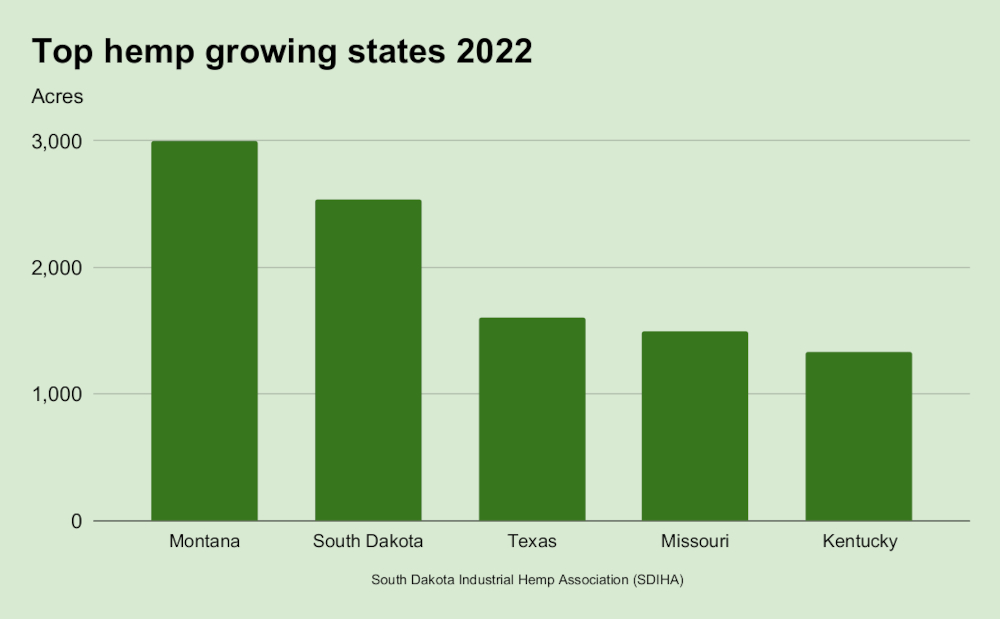The failure of a minor bill that would have helped CBD producers in South Dakota won’t have much of an effect on the overall hemp industry in the state, where farmers have pinned their hopes on fiber and seed.
The State Senate recently upheld Gov. Kristi Noem’s veto of a proposed law that would have revised rules for the handling of partially processed hemp flower material. The rules would have increased the amount of THC that can be present in hemp during the processing of hemp flowers into CBD and other cannabinoids from 0.3% to 0.5%.
The flexibility provided in the failed bill would have eased the path to market for cannabinoid producers, and given growers more options in the selection of hemp varieties, supporters said. Opponents employed the usual cannabis scare tactics in working to defeat the measure.
Missing the bust
Despite the squabbles, growing hemp for CBD never had the chance to catch on among farmers in South Dakota, which didn’t pass a hemp bill until 2020, two years after the 2018 Farm Bill legalized hemp federally.
The delayed developments now appear a blessing, with the state’s growers having escaped the CBD boom-and-bust that has devastated the hemp biomass sector as hemp flowers backed up in storage across the U.S. over the past three years and prices plunged by more than 90%.
South Dakota hemp farmers overwhelmingly put in grain and fiber crops from the start, with only 35 acres dedicated to CBD flower production in 2021, for example, according to state figures.
No. 2 growing state
One of few states which actually increased hemp acreage from 2021 to 2022, South Dakota saw fields rise 35% from 1,674 acres in 2021 to 2,540 acres last year, according to the state’s Department of Agriculture and Natural Resources (DANR). That puts South Dakota in second place as a grower of industrial hemp among all 50 states, according to analysis by the state’s Industrial Hemp Association.

Like other states across the northern U.S., South Dakota is well-suited to proven hemp grain and fiber cultivars from Europe, due to latitudinal and climate conditions. DANR said farmers see promise in producing hempseed for food products and fiber outputs for the construction and other industries.
The dead bill
Supporters of the now-dead bill addressing intermediate THC levels had stressed that the higher limit did not mean that products containing 0.5% delta-9 THC would end up in consumer products. THC levels from hemp flowers grown for cannabinoids sometimes rise during processing. Later stages in production can reduce the percentage in finished products.
“What this bill does not do, I will say it again, does not do, is allow products to be sold at five percent,” said Rep. Oren Lesmeister, a Democrat from Parade. And hemp from the field must still express THC of less than 0.3%, Lesmeister said.
Scare tactics
Opponents suggested that raising the in-processing limit for THC would lead to an increase in the potency and availability of THC-containing products. South Dakotans have already voted against recreational marijuana, they observed.
“It’s a back door to getting high,” said Rep. Mary Fitzgerald, a Republican from Spearfish.
“There are only two states in the United States that allow a product in process to contain up to five percent THC, and that’s that pesky Colorado and the state of New York. Both of those states have legalized recreational marijuana.” Fitzgerald said.
The debate over hemp and THC is muddled in South Dakota by the proliferation of delta-8 THC products, which are unregulated at both the state and federal levels. In their desperation to unload backed-up hemp flower biomass, growers turned to producers who make products containing delta-8, a synthetic form of THC based on hemp-derived CBD which, like marijuana-derived delta-9 THC, produces a high. Federal officials and officials in other states have warned consumers about the safety of both CBD and downstream delta-8 products because they are unregulated.
Flip-flopper
Noem, a Republican, has a history of flip-flopping on cannabis legalization. She vetoed a bill to legalize industrial hemp production in the state in 2019, saying it would create challenges law enforcement could not meet, and suggesting it would be a first step to eventually legalizing recreational marijuana. She eventually dropped her opposition and signed a hemp bill in 2020.
Noem later did a similar about-face on medical marijuana, endorsing a proposed 2021 bill that would have decriminalized possession of small amounts of marijuana by legal patients. That was after her failed attempts to use the South Dakota legislature to block the medical marijuana law approved in 2020 from taking effect in July 2021.
MMJ rules updated
The hemp THC measure was among a batch of bills Noem signed into law amending the state’s cannabis regulations, including one that expands patient eligibility for the state’s medical marijuana program for those suffering from AIDS/HIV, ALS (Lou Gehrig’s disease), multiple sclerosis, cancer or those undergoing chemotherapy for cancer, Crohn’s disease, epilepsy, and post-traumatic stress disorder (PTSD).
Two other new laws are restrictive. One prohibits health practitioners from providing patients with authorization to access medical marijuana if they are either pregnant or breastfeeding. Another bars physicians who recommend marijuana therapy from offering discounts or other financial incentives in exchange for their services.

